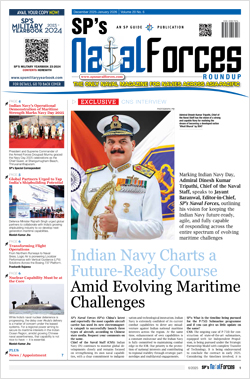INDIAN ARMED FORCES CHIEFS ON OUR RELENTLESS AND FOCUSED PUBLISHING EFFORTS

The insightful articles, inspiring narrations and analytical perspectives presented by the Editorial Team, establish an alluring connect with the reader. My compliments and best wishes to SP Guide Publications.

"Over the past 60 years, the growth of SP Guide Publications has mirrored the rising stature of Indian Navy. Its well-researched and informative magazines on Defence and Aerospace sector have served to shape an educated opinion of our military personnel, policy makers and the public alike. I wish SP's Publication team continued success, fair winds and following seas in all future endeavour!"

Since, its inception in 1964, SP Guide Publications has consistently demonstrated commitment to high-quality journalism in the aerospace and defence sectors, earning a well-deserved reputation as Asia's largest media house in this domain. I wish SP Guide Publications continued success in its pursuit of excellence.
- Global Partners Urged to Tap India's Shipbuilding Potential: Rajnath Singh at Samudra Utkarsh
- All about HAMMER Smart Precision Guided Weapon in India — “BEL-Safran Collaboration”
- India, Germany deepen defence ties as High Defence Committee charts ambitious plan
- G20 Summit: A Sign of Global Fracture
- True strategic autonomy will come only when our code is as indigenous as our hardware: Rajnath Singh
- India–Israel Joint Working Group Meeting on defence cooperation to boost technology sharing and co-development
News
DAC approves major changes in DPP
With the twin objective of infusing greater efficiency in the procurement process and strengthening the defence manufacturing base in the country, the Defence Acquisition Council (DAC), the apex decision-making body of the MoD, took a series of decisions on April 20 including amendments to Defence Procurement Procedure (DPP). The highlights of the amendments to the DPP 2011 are:
- Preference for indigenous procurement in the Defence Production Policy 2011 has now been made a part of DPP through an amendment that provides for a preferred order of categorisation, with global cases being a choice of last resort. The order of preference, in decreasing order, shall be: (1) “Buy (Indian)”; (2) “Buy & Make (Indian)”; (3) “Make”; (4) “Buy & Make with ToT”; and (5) “Buy (Global)”. Any proposal to select a particular category must now state reasons for excluding the higher preferred category/categories.
- The DAC has approved the release of a public version of its 15-year long-term integrated perspective plan (LTIPP), outlining the “Technology Perspective and Capability Roadmap” against LTIPP 2012-2027, to enable them to plan their future infra structure, R&D and technology thrust.
- Maintenance ToT (MToT) has been hitherto reserved largely for OFB and DPSUs through the nomination process. A DPP amendment has been approved that does away with nomination by Department of Defence Production and facilitates selection of MToT partners by Indian bidders.
- The DAC has approved an amendment mandating consultations to begin sufficiently in advance of actual procurement by Service Headquarters, so that capital acquisition plans can be translated into national defence research and development (R&D) and production plans. In addition, a high-level committee has also been constituted for simplification of “Make” procedures, with a view to unleash the full potential of this important category.
- The DAC has approved an amendment for “Buy & Make (Indian)” Procedure to further simplify it in order to bring it on par with other categorisations.
- Indigenous content has now been defined in an unambiguous manner, providing requisite clarity and a common understanding.
- The Ministry has a limited number of acquisition cases under “Make” and “Buy & Make (Indian)” categories, with an estimated value of Rs. 1,20,000 crore (about $21.8 billion). Instructions have been issued for speedier conclusion of these cases.
- The Indian defence industry was opened up in May 2001 for 100 per cent private sector participation subject to licensing. The Defence Items List has been finalised by the Ministry and sent to the Department Of Industrial Policy and Promotion (DIPP) for notification, which will bring required clarity in the licensing process.
- The Ministry has categorically clarified to DIPP that dual-use items will not require licensing, thereby, bringing added clarity to the licensing process.
- Draft Security Guidelines that will apply to all licensed defence industries have been circulated for consultations with various stakeholders. It is expected that a complete security framework for Indian private industries participating in defence cases will be in place in the near future.
- Resolution of deemed exports status for certain defence projects and rationalisation of tax and duty structures impinging on the Indian defence industry has been taken up by the MoD with the Ministry of Finance.
- The Defence Production Policy 2011 requires the setting up of a fund to provide necessary resources for development of defence equipment. In order to ensure regular supply of funds to micro small and medium enterprises involved in manufacturing of defence products, Small Industries Development Bank of India (SIDBI) has decided to earmark an amount of Rs. 500 crore for providing loans, and further, a fund of Rs. 50 crore for equity support out of “India Opportunities Fund” managed by its subsidiary, namely, SIDBI Venture Capital Ltd.
- A stipulation to freeze the Services Qualitative Requirement before the acceptance of necessity (AoN) stage has been accorded, and the validity of AoN has also been reduced from two years to one year. These measures are expected to expedite the acquisition process and increase transparency.
- The financial powers of Service Chiefs/DG Coast Guard have been enhanced from Rs. 50 crore to Rs. 150 crore for capital acquisition cases.
- Approval for all deviations from the Defence Procurement Procedure will henceforth be sought from the DACl instead of the Defence Minister.





